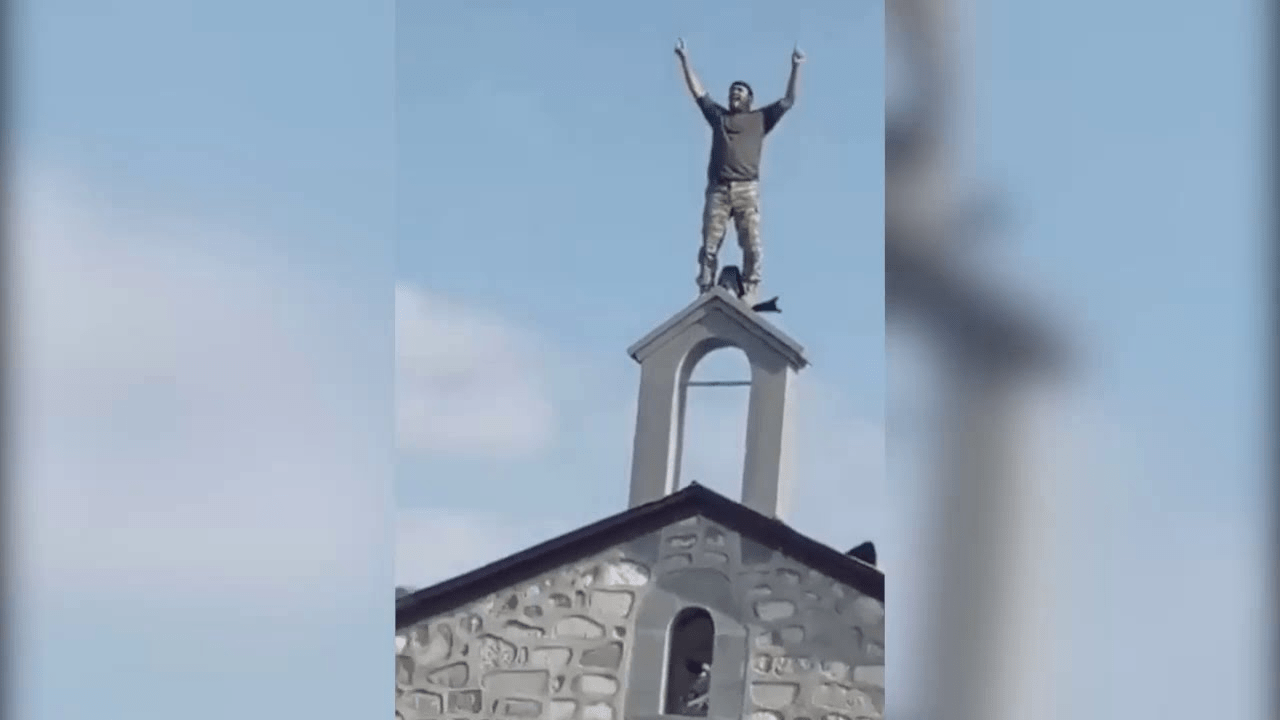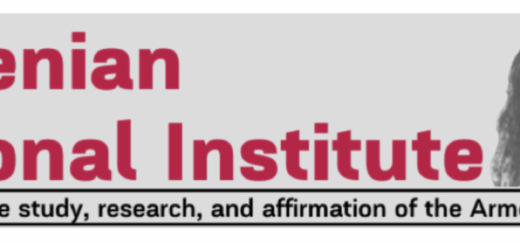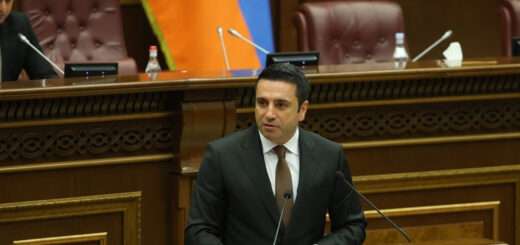The Artsakh World’s Silence on Artsakh’s Genocide

Azeri soldier removing cross from Armenian church, shouting Allahu Akbar
The Muslim World’s Silence on Artsakh’s Genocide
When 120,000 Christian Armenians were erased, not one Muslim nation spoke up. Some even celebrated
By Vic Gerami
Thebluntpost.com
Historical Context: Artsakh’s Legal and Cultural Status
For millennia, Artsakh has been an integral part of historic Armenia and has never been part of an independent Azerbaijani state. Archaeological and historical evidence places Armenian governance of the region as far back as the 9th to 6th centuries BC. In the seventeenth century Artsakh became part of the Russian Empire.
In 1921, Soviet dictator Joseph Stalin placed Artsakh under the administration of the Azerbaijan Soviet Socialist Republic as an autonomous oblast. The decision, made under pressure from Turkey and economic coercion from oil-rich Azerbaijan, violated both international law and the prior decision of the Bureau of the Communist Party, which had confirmed Artsakh’s rightful status as part of Armenia. Despite this administrative change, the population of Artsakh remained overwhelmingly Armenian and preserved its cultural and religious identity.
On December 10, 1991, as the Soviet Union disintegrated, the people of Artsakh held a plebiscite to declare the independent Republic of Artsakh. This act complied with Soviet and international law and established Artsakh’s sovereignty concurrently with that of the Republic of Azerbaijan. The declaration created two equal successor states on the territory of the former Azerbaijani SSR: the Republic of Azerbaijan and the Republic of Artsakh.
The Artsakh Genocide
Between September 2020 and September 2023, Azerbaijan, with the full support of Turkey, foreign jihadist mercenaries from Syria, Libya, and Pakistan, and weapons supplied by Turkey, Russia, and Israel, launched a campaign of extermination against the Armenians of Artsakh. Sophisticated and in some cases banned weapons were used to massacre more than five thousand soldiers and civilians and occupy 75 percent of the territory.
On November 9, 2020, Russia brokered a ceasefire that Azerbaijan repeatedly violated. The remaining Armenian population was subjected to continuous attacks, home burnings, and deliberate acts of terror intended to force them out. Beginning on December 12, 2022, Azerbaijan blocked the Lachin Corridor, Artsakh’s only road connection with Armenia, under the guise of an environmental protest. The blockade, organized by individuals tied to the Azerbaijani government, deprived the region of food, medicine, and fuel.
By mid-2023, the Lemkin Institute for Genocide Prevention and Genocide Watch had each stated that the situation in Artsakh met the legal criteria for genocide under the 1948 UN Convention on the Prevention and Punishment of the Crime of Genocide. The Lemkin Institute’s September 5 report, Risk Factors and Indicators of the Crime of Genocide in the Republic of Artsakh, warned that the total blockade had trapped 120,000 civilians, including about 30,000 children, leaving them without access to essentials and at risk of starvation.
On February 22, 2023, the International Court of Justice (ICJ) ordered Azerbaijan to lift the blockade and allow humanitarian access. Instead, on April 23, 2023, Azerbaijani forces installed a checkpoint at the Hakari Bridge, tightening the closure. On September 19, 2023, Azerbaijan began bombardment of civilian areas, killing and injuring hundreds. Within days, nearly all of Artsakh’s 120,000 Armenians fled to Armenia. On November 17, 2023, the ICJ again ordered Baku to guarantee the safe and unimpeded return of those displaced. Azerbaijan has ignored both rulings.
Imported Jihad: Turkey’s Proxy War through Mercenaries
Evidence collected by BBC News, Reuters, The Guardian, and the Syrian Observatory for Human Rights (SOHR) confirms that Turkey transported thousands of Syrian fighters to Azerbaijan to fight against Armenians. These men, recruited under false pretenses of working as security guards, were placed on the front lines and paid between $1,500 and $2,000 per month. SOHR documented more than 2,500 mercenaries sent to the region, with at least 541 killed.
Investigations by Carnegie Europe and French intelligence sources found that Turkey viewed the Artsakh operation as part of its broader proxy-warfare strategy used in Syria and Libya. Mercenaries from Libya and military advisors from Pakistan joined Azerbaijan’s ranks. This multinational assault transformed what Baku called a territorial operation into an ideologically charged campaign that merged religious nationalism, resource interests, and ethnic hatred.
What unfolded in Artsakh was the collision of faith and realpolitik. The campaign drew upon the symbolism of Islamic unity to rally support across Turkic and Muslim networks while masking the deliberate destruction of an ancient Christian community.
Religious Rhetoric and the “Holy War” Narrative
Throughout the assault, leaders in Ankara and Baku used religious imagery to justify violence. Turkish President Recep Tayyip Erdoğan hailed the offensive as “a victory for the Turkic and Islamic world.” Azerbaijani President Ilham Aliyev described the seizure of Sushi as “the return of our Islamic heritage.” Imams were filmed blessing captured positions while state media framed the campaign as a moral triumph.
Analysts at Carnegie Middle East Center and International Crisis Group noted that this rhetoric mobilized regional support and presented the campaign as a sacred duty rather than an act of aggression. The blending of religious fervor with geopolitical ambition deepened the persecution of Artsakh’s Armenians, who were portrayed not as civilians but as obstacles to a restored Islamic-Turkic realm.
The Silence and Selective Outrage of the Muslim World
As the catastrophe unfolded, not one Muslim-majority nation condemned Azerbaijan’s actions. The Organization of Islamic Cooperation (OIC) reaffirmed its support for Azerbaijan’s “territorial integrity.” Pakistan declared “full solidarity” and later signed the 2021 Baku Declaration with Turkey and Azerbaijan. Qatar, Saudi Arabia, and the United Arab Emirates maintained silence while their state-run media celebrated Azerbaijan’s victory. Iran and Malaysia
likewise avoided criticism despite verified evidence of atrocities. This silence stands in sharp contrast to the same nations’ passionate condemnations of violence in Palestine, Kashmir, or Myanmar. Analysts at the Brookings Doha Center and Carnegie Middle East Center describe this selective response as rooted in political calculation, religious solidarity, and economic dependency. By aligning themselves with Azerbaijan and Turkey, these governments chose expedience over moral consistency.
When the final exodus of 120,000 Armenians emptied Artsakh, there were no emergency summits, humanitarian appeals, or condemnations. The moral vocabulary once used to defend oppressed Muslim populations was absent.
The Complicity of the West
The failure to act was not confined to the Islamic world. Western democracies that claim to champion human rights also turned away. The European Union and the United States issued statements of concern but took no meaningful action even as Azerbaijan’s blockade violated international rulings. Energy interests, arms sales, and geopolitical alignment with Baku as a counterweight to Russia took precedence over human life.
International observers from Freedom House, Human Rights Watch, and Amnesty International documented the destruction of Armenian churches, cultural monuments, and civilian infrastructure. Yet these findings produced no sanctions and no coordinated response. The West’s reluctance to confront Azerbaijan revealed the same selective morality that had paralyzed Muslim capitals.
The Cost of Silence: Collapse of Moral Geography
The silence of both Muslim-majority and Western nations during the Artsakh genocide reflects a global erosion of moral coherence. By accepting Azerbaijan’s narrative and ignoring the documented atrocities, governments across the world validated a blueprint for impunity. When genocide becomes negotiable, humanitarian law loses its meaning.
The Artsakh Genocide, as identified by the Lemkin Institute for Genocide Prevention, Genocide Watch, and other genocide-prevention experts, is both a humanitarian and ethical indictment of our era. The eradication of an ancient Christian community that had declared independence lawfully under international and Soviet law is a warning of how fragile moral order has become.
Silence in the face of genocide does not merely reflect indifference. It reshapes moral geography. It tells persecutors that crimes committed in the shadows of geopolitics will be excused. Until nations learn to defend human life based on principle rather than affiliation, genocide will remain not only the crime of the perpetrators but also the collective failure of those who refused to speak.
Sources & References
Historical and Legal Context
Armenian National Archives. Documents on the Historical Status of Artsakh (Nagorno-Karabakh).
Council of Europe. Legal Aspects of the Nagorno-Karabakh Conflict. 1992.
De Waal, Thomas. Black Garden: Armenia and Azerbaijan Through Peace and War. New York University Press, 2013.
U.S.S.R. Constitutional Law. Articles on autonomy and succession, 1990–1991.
International Court of Justice (ICJ). Armenia v. Azerbaijan, Order on Provisional Measures, 22 February 2023 and 17 November 2023.
Lemkin Institute for Genocide Prevention. Risk Factors and Indicators of the Crime of Genocide in the Republic of Artsakh. 5 September 2023.
Genocide Watch. Azerbaijan: Genocide Emergency – Artsakh (Nagorno-Karabakh). 2023.Mercenaries and Proxy Warfare
BBC News. “Syrian Mercenaries Deployed by Turkey to Support Azerbaijan.” October 2020.
Reuters. “Exclusive: Syrian Fighters Deploy to Azerbaijan in Sign of Turkey’s Ambition.” October 2020.
The Guardian. “Syrian Mercenaries Deployed by Turkey in Azerbaijan Conflict.” October 2020.
Syrian Observatory for Human Rights (SOHR). “Over 2,500 Syrian Mercenaries Sent by Turkey to Fight in Nagorno-Karabakh.” 2020.
Le Monde (France). “France Confirms Reports of Syrian Mercenaries Fighting in Azerbaijan.” November 2020.
Carnegie Europe. Turkey’s Proxy Warfare Model and Its Implications in the South Caucasus. 2021.
The Washington Post. “Turkey’s Use of Syrian Fighters Expands Ankara’s Reach.” October 2020.Religious and Ideological Rhetoric
Anadolu Agency (Turkey). Erdoğan speech: “Victory for the Turkic and Islamic World.” November 2020.
AZERTAC (Azerbaijan State News Agency). Aliyev speech in Shusha: “Return of Our Islamic Heritage.” November 2020.
Carnegie Middle East Center. Religious Rhetoric and Power Projection in Turkey’s Regional Policy. 2021.
Al-Monitor. “Erdoğan’s Pan-Islamic Narrative in the Caucasus Conflict.” October 2020.
International Crisis Group. Improving Prospects for Peace after the Nagorno-Karabakh War. 2021.Silence of Muslim-Majority Nations
Organization of Islamic Cooperation (OIC). “Support for Azerbaijan’s Sovereignty and Territorial Integrity.” October 2020.
Pakistan Ministry of Foreign Affairs. “Statement on Azerbaijan’s Territorial Integrity.” September 2020; “Baku Declaration of Trilateral Cooperation.” January 2021.
Qatar News Agency. “Qatar Congratulates Azerbaijan on Ceasefire.” November 2020.
Saudi Press Agency. “Saudi Arabia Congratulates Azerbaijan on Liberated Territories.” November 2020.
Brookings Doha Center. Geopolitics and Solidarity: Muslim World Responses to the Armenia–Azerbaijan Conflict. 2021.
Carnegie Middle East Center. Strategic Silence: Why Muslim States Ignored the War in Nagorno-Karabakh. 2022.
Tehran Times. “Iran Calls for Respect for Territorial Integrity of Azerbaijan.” 2020.Human-Rights Documentation and Genocide Recognition
Human Rights Watch. Unlawful Strikes on Armenian Civilians in Nagorno-Karabakh. October 2020.
Amnesty International. Cluster Munitions and Unlawful Targeting During the Conflict. 2021.
Freedom House. Artsakh’s Vanishing Democracy: Aftermath of the 2020 Assault. 2021.
Lemkin Institute for Genocide Prevention. Red Flag Alerts for Genocide in Artsakh (Nagorno-Karabakh). 2020–2023.
Genocide Watch. Stages of Genocide: Azerbaijan – Nagorno-Karabakh. 2023.
UNHCR. Humanitarian Update: Displacement from Nagorno-Karabakh. 2023.
European Parliament. Resolution 2023/2824 (RSP): On the Destruction of Armenian Cultural Heritage and the Forced Displacement of Armenians. 2023.Global Double Standards and Western Response
Foreign Policy. “Why the World Stayed Silent on the Nagorno-Karabakh Crisis.” 2021.
Carnegie Endowment for International Peace. The Regional Fallout of the Caucasus War and Global Hypocrisy. 2022.
Council on Foreign Relations (CFR). The Aftermath of Nagorno-Karabakh: Lessons in Geopolitical Morality. 2021.
Freedom House. The Retreat of Global Accountability. 2023.





